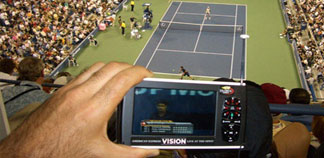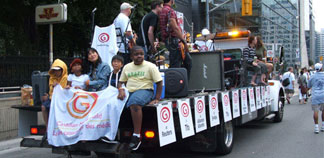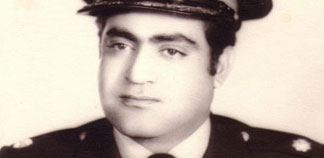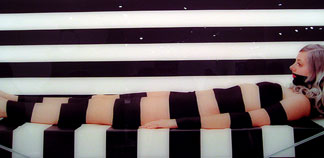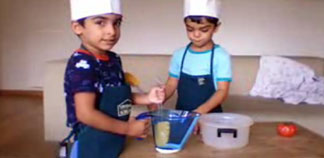به زبان فارسی
PICTORY
LATEST MUSIC
SEARCH
ROCK
07-Sep-2007 (2 comments)
"We’re not Pink Floyd" he says. "Why do they expect us to be Pink Floyd?" Those are words from Arash Sobhani, singer/songwriter of Kiosk, the Iranian rock band that has been making quite a name for itself in the past two years. Since the days I wrote and published the conversation we had on Orkut in November 2005, the band has made a major leap in making itself known to the general public, and quite successfully, I might add. As I also run the Kiosk fan community on Orkut, the release of their second album a few months ago gave me the opportunity to have a second conversation with not only Arash, but also with Babak Khiavchi, head of Bamahang Productions (Kiosk’s record label) and Ahmad Kiarostami, the director of the now famed Eshghe Sorat video. >>>
TORONTO
06-Sep-2007 (2 comments)
من از گوشه جاز کیوسک به کیوسک وصل شدم. شهروز مولایی ، جازیست گروه کیوسک در یک پیشنهاد بی شرمانه از من خواست که برای ترانه "افسوس" هلهله بزنم. مساله هلهله خدا را شکر منتفی شدم و جایش هلهله عروسی علی کمالی (بیسیت گروه)را جایگزین کردند. ولی من دیگر درگیر شده بودم و این درگیری یعنی بعنوان مثال چند آخر هفته تمام خزیدن در خانه و سیفون نکشیدن برای جلوگیری از ایجاد صدای زاید در هنگام ضبط جاز " تو کجایی " و یا در یک روز منفی چهل و سه درجه کانادایی ، ساعت سه صبح با شهروز کیوسک تا اتاوا رفتن برای اخذ ویزا برای اولین کنسرت کیوسک در سانفرانسیکو . آلبوم عشق سرعت از نظر من یک آلبوم کاملن زیر زمینی است. همه آلبوم در زیر زمین دو خانه در تورنتو ضبط شده است. یک خانه در شمال تورنتو و خانه ما. >>>
FRIENDS
05-Sep-2007 (3 comments)
I like to write. I dream of writing wonderful, amazing fiction, but then reality happens, and it’s more amazing and powerful than fiction. Maybe “truth” as it is simply cannot be overshadowed by “truth” as I imagine it should be. Today I read this story about a young Iranian man. His name is Sina. He is 18 years old, and he was going to be hanged. When he was much younger, he killed a drug dealer, and by Iranian law, he had two options: He could wait to be executed on his 18th birthday or he could extract the forgiveness of the victim’s family and pay them the blood money. The amount was not specified in the story I read, but in Iran, each life has an exact price. Those who are rich enough or have the right connections, might consider justice an attainable ambition.
>>>
CONSPIRACY
04-Sep-2007 (one comment)
Honestly, I kind of agree with most but not all conspiracy theories. If we look at recent Persian history, there is now documented evidence that foreigners, especially the British, did in fact meddle badly in our affairs. They overthrew governments, toppled dynasties, and had prime ministers and other high officials assassinated or replaced. In fact, I wish George W. Bush, being a strong ally of British, would have learned a few things from them when it comes to dealing with the Middle East. Incidentally, did you notice that for the first 3 years of the war in Iraq, southern Iraq which, was under the control of British troops, was the quietest area? Accident? I think not.>>>
NEW GENERATION
04-Sep-2007
چند سالیست که در هر گوشه و کنار وقتی پای صحبت با ایرانیان را باز میکنم و در مورد مسایل مربوط به کشورم و
یا بهتر بگم هموطنانم در داخل و جامعه ایرانی در خارج از کشور بحث و گفتگو
اغاز میشه همیشه در یک نقطه ای از این گفتگوها همه چیز به نسل جدید یا
جوان یا بهتر بگم نسل مدرن و پیشرفته ایرانی ختم میشه. در حقیقت همه کم و کاستی نسل قبل از نسل جدید یکدفعه سپرده میشه به نسل امروز ایران حتی در خیلی از موارد معرف
ایران مدرن یا ایرانیان مدرن نیز به دوش این نسل قرار میگیرد و همچنین
قرار این نسل آبروی از دست رفته ما ایرانیان را در همه عرصه ها به ما برگرداند. >>>
AIRBORNE
03-Sep-2007
Sunday afternoon, an aviation guru friend of mine and I took a drive to Bealeton, VA, located 60 miles South West of Washington, DC to check out a 1930s air show called The Flying Circus and what a delightful circus it was! Melodies of the 20s blasting in the background, a re-enacted 20s radio personality reporting the latest and the greatest in the style of the time, old retired air force pilots relaxing under their straw hats, reminiscing about the old war years, and kids with balloons in one hand, melting ice cream in the other, fully mesmerized by the site of the planes, helped recapturing the sights and sounds of bygone days.>>>
VISUAL
03-Sep-2007
I was doing some personal research on how Hollywood film fashion and the American Way of Life had influenced Persian Society particularly in the 50's and 60's. It was for an article on American Soprano Monika Jalili and her Noorsaaz Band who have revived ( and translated from Persian) some of the great music score's of Iran's Pre-Revolution classic movies. I thus came across a book precisely on one of Hollywood's quintessential icon's of the swinging sixties: Audrey Hepburn the Paramount Years by Tony Nourmand.
>>>
WORDS
29-Aug-2007 (2 comments)
Global communication and the urge to become one with the world has
brought on drastic changes and bent a few rigid rules. Long gone are
the days when we used different greeting for different people. Just
three decades ago, you never said goodbye to your seniors with “Bye” or
even the common term of ghorbanat – meaning may I be sacrificed for
you! Instead, where I grew up, you had to say sayeh-toon-kam nasheh --
may your shadow never diminish. Or Marhamat-e-shoma-ziyad -- may your
favors increase! The undertone was understood, yet such formal
expressions often required additional gestures such as a bow, hand
kissing, or simply standing up. I never understood why my father said
taazeem arz meekonam when talking on the phone, and to this day can’t
imagine the need to verbally bow to anyone.
>>>
VIEW
29-Aug-2007 (6 comments)
Farhad is not just an ordinary friend. I have known him since high school. We were also roommates at college in Iran in the early 1970’s. While a Junior at college, he was arrested by Savak (Shah’s secret police) for distributing political pamphlets, put into prison, and sent to the Army to serve a mandatory 2 years service. I lost touch with him for over 25 years. A few years ago while visiting Iran , a mutual friend invited me to a college reunion in Tehran and it was there that I saw Farhad again. He told me the story of his life and how he was able to finish his engineering degree after completing his term in the army, how he was briefly detained again after the revolution, and how he began working like a ‘normal’ person, as he puts it, in the engineering and construction field.>>>
SCRIPT
28-Aug-2007
I stopped wearing a hejab at twelve, and at thirteen my clothing style
gradually grew shorter. I thought that the entire point of hejab was to
blend a woman with her surroundings, and if my surroundings exercised
their right to bear skin, shouldnŒt my hejab follow in pursuit? For a while it worked, but the longer time passed since I wore my
hejab, the more and more I felt like a sore thumb. I felt displaced,
homeless, and when I sought safety, I would crawl onto my bed and drape
my blanket over my entire head and body. Even today, when I remember
the empty act of praying, I don't remember the foreign words or the
unexplained movements so much as I remember the light, see-through
cloak that enveloped me, embraced me, and if I had any faith in God
during my five daily prayers, it was in the feeling that as long as I
was engulfed by his hejab, I was safe.
>>>
RECENT COMMENTS
IRANIANS OF THE DAY
| Person | About | Day |
|---|---|---|
| نسرین ستوده: زندانی روز | Dec 04 | |
| Saeed Malekpour: Prisoner of the day | Lawyer says death sentence suspended | Dec 03 |
| Majid Tavakoli: Prisoner of the day | Iterview with mother | Dec 02 |
| احسان نراقی: جامعه شناس و نویسنده ۱۳۰۵-۱۳۹۱ | Dec 02 | |
| Nasrin Sotoudeh: Prisoner of the day | 46 days on hunger strike | Dec 01 |
| Nasrin Sotoudeh: Graffiti | In Barcelona | Nov 30 |
| گوهر عشقی: مادر ستار بهشتی | Nov 30 | |
| Abdollah Momeni: Prisoner of the day | Activist denied leave and family visits for 1.5 years | Nov 30 |
| محمد کلالی: یکی از حمله کنندگان به سفارت ایران در برلین | Nov 29 | |
| Habibollah Golparipour: Prisoner of the day | Kurdish Activist on Death Row | Nov 28 |


